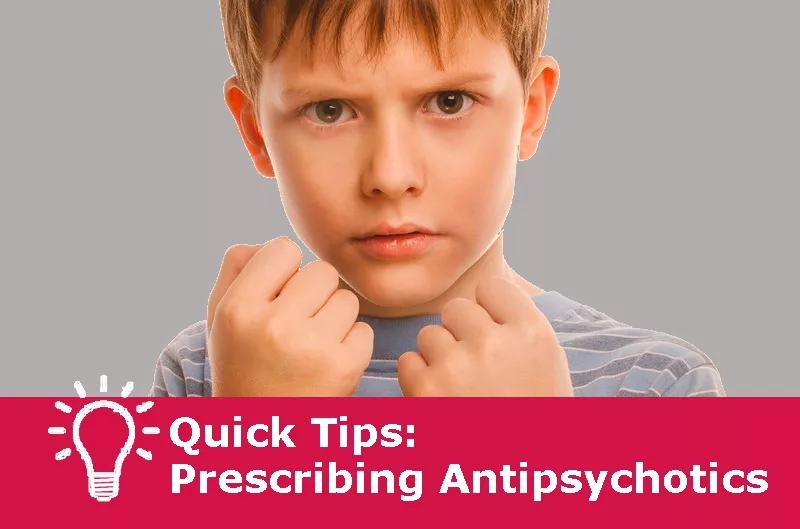The TOSCA study focused on children with severe ADHD, who also met criteria for oppositional defiant disorder (ODD) or conduct disorder (CD). These children tend not to do as well with stimulants alone and often end up being prescribed antipsychotics, typically second generation antipsychotics (SGA’s). TOSCA was devised to help clinicians determine when/if to use an antipsychotic (Barterian JA et al, J Am Acad Child Adolesc Psychiatry 2017;56(12):1026–1033).
Writing in the July/August issue of The Carlat Child Psychiatry Report, Candace Good, MD, outlines the following recommendations from the TOSCA findings, which we hope you’ll find useful:
First, give stimulants and parent training time to work. The investigators recommend that, after parent training (PT) is started and the stimulant drug is optimized, clinicians should wait at least 1 month before adding an antipsychotic. This is because the combined benefit of stimulant and PT continues to increase over a 6-week period. Clinicians can expect ongoing improvement beyond the first 3 weeks and waiting a bit longer for the primary interventions to work would result in fewer patients requiring a second drug.
Think about other interventions before SGAs. PT and stimulant titration are first-line treatments, but if after 4–6 weeks there is room for symptom improvement, try a different stimulant. Next, if there is evidence of anxiety, treat with an SSRI and/or CBT prior to considering an antipsychotic. If the patient has ongoing aggression despite the stimulant and PT, an antipsychotic can be added. Since we don’t, however, have good research to show that continued use of antipsychotics actually helps in these cases—and these are not benign drugs—consider tapering it after 6 months.
If an antipsychotic is necessary, consider risperidone. The TOSCA results support the efficacy of risperidone, with statistically significant improvement on the primary outcome measure, NCBRF Disruptive-Total subscale (D-Total; p = 0.0016), as well as other measures. Risperdone is one of the dirtier SGA’s for side effects, so watch lipids, glucose, prolactin and look for extrapyramidal side effects.
Bottom line
For patients with severe disruptive symptoms, proceed carefully and avoid jumping to antipsychotics. Push for parent training and, when indicated, CBT. The side effects of risperidone and the lack of data on other antipsychotics in this situation are problematic. Moreover, our patients often have mood and developmental challenges that were excluded in TOSCA and likely limit the benefit of this approach.
To read the full article in The Carlat Child Psychiatry Report, click here. Not a subscriber? Join here.
Writing in the July/August issue of The Carlat Child Psychiatry Report, Candace Good, MD, outlines the following recommendations from the TOSCA findings, which we hope you’ll find useful:
First, give stimulants and parent training time to work. The investigators recommend that, after parent training (PT) is started and the stimulant drug is optimized, clinicians should wait at least 1 month before adding an antipsychotic. This is because the combined benefit of stimulant and PT continues to increase over a 6-week period. Clinicians can expect ongoing improvement beyond the first 3 weeks and waiting a bit longer for the primary interventions to work would result in fewer patients requiring a second drug.
Think about other interventions before SGAs. PT and stimulant titration are first-line treatments, but if after 4–6 weeks there is room for symptom improvement, try a different stimulant. Next, if there is evidence of anxiety, treat with an SSRI and/or CBT prior to considering an antipsychotic. If the patient has ongoing aggression despite the stimulant and PT, an antipsychotic can be added. Since we don’t, however, have good research to show that continued use of antipsychotics actually helps in these cases—and these are not benign drugs—consider tapering it after 6 months.
If an antipsychotic is necessary, consider risperidone. The TOSCA results support the efficacy of risperidone, with statistically significant improvement on the primary outcome measure, NCBRF Disruptive-Total subscale (D-Total; p = 0.0016), as well as other measures. Risperdone is one of the dirtier SGA’s for side effects, so watch lipids, glucose, prolactin and look for extrapyramidal side effects.
Bottom line
For patients with severe disruptive symptoms, proceed carefully and avoid jumping to antipsychotics. Push for parent training and, when indicated, CBT. The side effects of risperidone and the lack of data on other antipsychotics in this situation are problematic. Moreover, our patients often have mood and developmental challenges that were excluded in TOSCA and likely limit the benefit of this approach.
To read the full article in The Carlat Child Psychiatry Report, click here. Not a subscriber? Join here.


_-The-Breakthrough-Antipsychotic-That-Could-Change-Everything.webp?t=1729528747)



